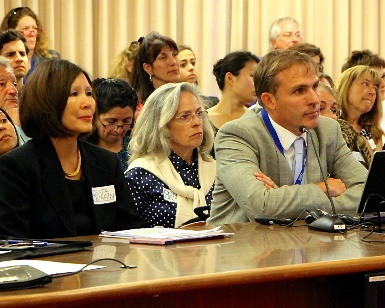San Rafael, CA – The Marin County Board of Supervisors voted July 28 to approve the first reading of an ordinance that requires pharmaceutical companies to manage and fund a comprehensive countywide program to collect and dispose of unwanted, unused and expired over-the-counter and prescription drugs.
 A merit hearing for the ordinance, co-authored by the Marin County Department of Health and Human Services (HHS) and the Marin Community Development Agency’s Environmental Health Services (EHS) division, is scheduled for 10:30 a.m. August 11 in the Marin County Civic Center Board Chamber in San Rafael.
A merit hearing for the ordinance, co-authored by the Marin County Department of Health and Human Services (HHS) and the Marin Community Development Agency’s Environmental Health Services (EHS) division, is scheduled for 10:30 a.m. August 11 in the Marin County Civic Center Board Chamber in San Rafael.
If finalized, the ordinance would go into effect on September 11, 2015, and Marin would join the ranks of Alameda, San Francisco, San Mateo, and Santa Clara counties, all of which have similar ordinances in place to address the growing issue of prescription drug abuse, misuse, and disposal. Nationally, overdose-related deaths from pharmaceutical drugs have surpassed the combined number of deaths attributed to heroin and cocaine overdoses.
“We’re learning that the same medicines we use to improve our health are also causing real harm in this epidemic of misuse,” said Dr. Matt Willis, Marin County’s Public Health Officer. “Too often, our medicine cabinets are the source of drugs that end up being abused. As we raise awareness of this problem, people are asking for safe and convenient ways to dispose of leftover medications. This ordinance provides that.”
In addition to posing serious potential health risks, unwanted pharmaceutical drugs that are not properly discarded can also be an environmental hazard. Toxins in medications flushed down drains or toilets are not removed in sewage treatment plants and can pollute local water supplies and endanger wildlife when released into the San Francisco Bay or local streams. Additionally, drugs thrown into the trash and end up in landfills can contaminate ground water in addition to posing a serious risk to children and pets that find them before the garbage is picked up.
Without options for safe disposal, the alternative to flushing or dumping unwanted pharmaceutical drugs – keeping them at home – can sometimes pose an even greater threat to residents. Nearly one in five Marin teens report having used prescription narcotics recreationally and 27 people in Marin County died from accidental drug overdose in 2013, the most recent year for which numbers have been calculated.
The County has concluded that the current 16 safe drug take-back locations are inadequate to serve the needs of the county’s 258,000 residents and recommends a minimum of 25 locations. Recent studies have revealed that nearly half of the U.S. population takes at least one prescription drug, and 40 percent of adults age 65 and older take five or more. It is expected that the use of prescription drugs in the county will increase in step with Marin’s median age, and Willis said the problem is “the biggest addiction crisis Marin has ever faced.”
The ordinance will require pharmaceutical companies whose drugs are sold in Marin County to submit a stewardship plan within one year that would describe how they would operate a safe disposal program to collect and destroy unwanted drugs and medications. In addition, companies would be required to provide outreach and education to the community on the safe drug disposal. The County will provide assistance and approval to plans, and companies would be fully responsible for any associated administrative costs to the County in addition to fully covering the costs of implementing their safe disposal plans.
The ordinance, which would apply countywide and also covers medications intended for animals, is part of a series of initiatives Marin HHS and EHS have pursued in curbing prescription drug use and abuse in Marin. Last winter they collaborated with RxSafe Marin, a coalition of community stakeholders, to produce the eight-page informational guide, A Prescription for Change. The guide was created as an education tool and community resource on the dangers of prescription drug abuse.
“Having a network of safe and convenient drop-off locations will be a key component to making the community safer in years to come,” said Rebecca Ng, who leads the EHS division.
Photo caption: Rebecca Ng, director of the County's Environmental Health Services division, and Dr. Matt Willis, the County's Public Health Officer, listen during the July 28 Board of Supervisors meeting.